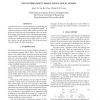114 search results - page 2 / 23 » Energy-efficient FPGA interconnect design |
AC
2005
Springer
13 years 5 months ago
2005
Springer
Reducing power consumption has become a major challenge in the design and operation of today's computer systems. This chapter describes different techniques addressing this c...
FPGA
2008
ACM
13 years 6 months ago
2008
ACM
Logical effort (LE) is a linear technique for modelling the delay of a circuit in a technology independent manner. It offers the potential to simplify delay models for FPGAs and g...
FPGA
2008
ACM
13 years 6 months ago
2008
ACM
This paper describes the Amorphous FPGA, an innovative architecture attempting to optimally allocate logic and routing resource on per-mapping basis. Designed for high performance...
ICCAD
2004
IEEE
14 years 2 months ago
2004
IEEE
Power is an increasingly important design constraint for FPGAs in nanometer technologies. Because interconnect power is dominant in FPGAs, we design Vdd-programmable interconnect ...
FPGA
2003
ACM
13 years 10 months ago
2003
ACM
How does multilevel metalization impact the design of FPGA interconnect? The availability of a growing number of metal layers presents the opportunity to use wiring in the thirddi...

